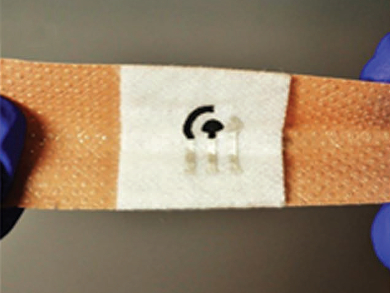Wearable sensors can, e.g., detect vital signs or analyze bodily fluids. However, the ability to detect enzyme biomarkers and the use of such devices for cancer screenings have not been reported so far.
Joseph Wang, University of California, San Diego, La Jolla, USA, and colleagues have developed a wearable bandage-based sensor that can be applied to a skin mole and detect the enzyme tyrosinase. Tyrosinase (TYR) is a biomarker for melanoma, a type of skin cancer. The team prepared a bandage sensor (pictured) with a flexible three-electrode system and a biocompatible hydrogel that contains catechol. TYR can oxidize catechol to benzoquinone. This product is then reduced and measured amperometrically at a printed carbon working electrode. The bandage is combined with a flexible electronic board with potentiostatic circuitry and wireless data transmission to a mobile device.
The system’s performance was tested using TYR-containing agarose gel and porcine (pig) skin. The sensor was able to detect the presence of TYR and discriminate between different levels of the enzyme. The team also developed a minimally invasive microneedle biosensor filled with catechol-coated carbon paste which can reach melanoma tissue under the skin. According to the researchers, such a screening could reduce the need for biopsies, as well as delays and anxiety for patients.
- Wearable Wireless Tyrosinase Bandage and Microneedle Sensors: Toward Melanoma Screening,
Bianca Ciui, Aida Martin, Rupesh K. Mishra, Barbara Brunetti, Tatsuo Nakagawa, Thomas J. Dawkins, Mengjia Lyu, Cecilia Cristea, Robert Sandulescu, Joseph Wang,
Adv. Healthcare Mater. 2018.
https://doi.org/10.1002/adhm.201701264




